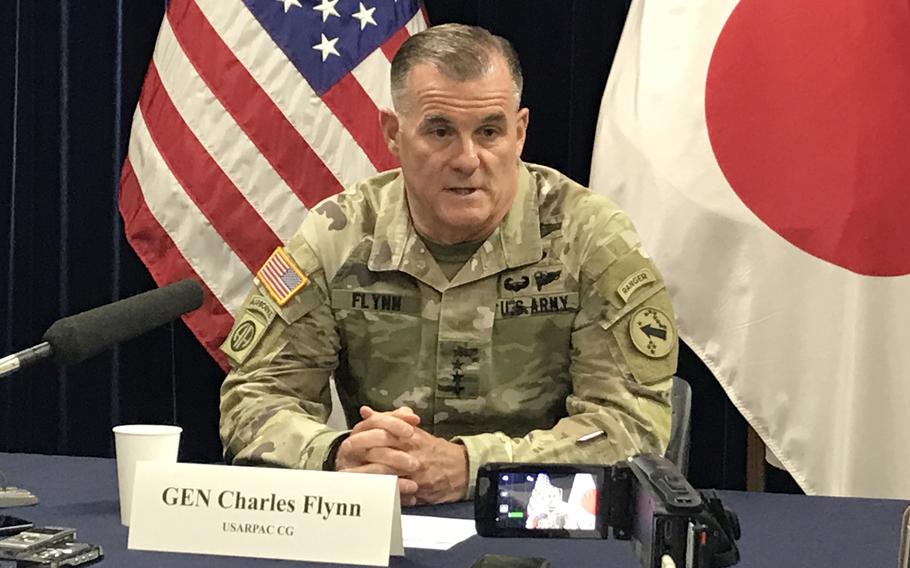
U.S. Army Pacific commander Gen. Charles Flynn speaks to reporters during a media roundtable at the U.S. Embassy in Tokyo on April 3, 2024. (Seth Robson/Stars and Stripes)
TOKYO — The U.S. Army will field newly developed missiles in the Indo-Pacific region this year with additional types in the pipeline, it’s Pacific-area commander told reporters on a recent visit to the Japanese capital.
“I’m not going to discuss what system and I’m not going to say where and when,” Gen. Charles Flynn said during a media roundtable Tuesday at the U.S. Embassy. “I’m just saying that there will be a long-range precision fires capability.”
The U.S. and allies Japan and the Philippines are gearing up for a potential fight with China, which boasts a formidable missile force, around Taiwan or in the South China Sea.
In November, Flynn told reporters at the Halifax International Security Forum in Canada that the Army would deploy a limited number of Tomahawk and SM-6 missiles to the region, according to a Nov. 19 report in Defense One.
Land-based Tomahawks, with a range of over 1,500 miles, were banned under the 1987 Intermediate-Range Nuclear Forces Treaty. But the U.S. pulled out of the treaty in 2019, due to Russian non-compliance, and the Marine Corps established its first Tomahawk unit in July 2023 at Camp Pendleton, Calif.
“I’m not going to say where or when we will deploy in 2024,” Flynn said in Japan. “There’s actually multiple systems in development.”
Flynn during the Tokyo roundtable mentioned the Typhoon launcher, which is designed to fire the SM-6 and Tomahawk missiles. That system has a “hypersonic capability,” he said, referring to missiles that can travel faster than five times the speed of sound.
Flynn also spoke about the long-range, anti-ship Precision Strike Missile, which is set to reach initial operating capability this year.
“This new surface-to-surface weapon system will deliver enhanced capabilities to attack, neutralize, suppress and destroy targets using missile-delivered indirect fires out to 499+ kilometers (310+ miles),” manufacturer Lockheed Martin wrote on its website.
“We shoot HIMARS in a number of these countries today,” Flynn said in Halifax. “This is just a different missile to put into it. So, I don’t necessarily think we need to have an agreement (with other countries) ahead of time.”